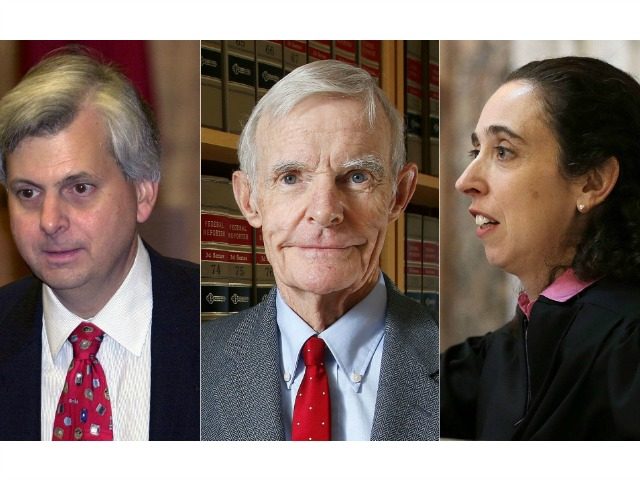Three judges on the U.S. Court of Appeals for the Ninth Circuit heard arguments on whether to grant an emergency stay of a district judge’s issuance of a temporary restraining order (TRO) blocking President Trump’s Executive Order (EO) 13769.
District Judge James Robart issued a shockingly broad nationwide TRO blocking EO 13769, in an order that contained almost no legal reasoning that could be reviewed by other courts.
Judges Michelle Friedland (an Obama appointee), William Canby (Carter), and Richard Clifton (George W. Bush) heard arguments on the emergency motion.
Representing the Trump administration, August Flentje from the U.S. Department of Justice (DOJ) asserted that the EO was rooted in an assessment of risk in which the government balances welcoming foreigners with protecting the physical safety of American citizens. It is a “national security judgment entrusted to the political branches of government,” Flentje said.
DOJ added that the EO was “a short halt” of immigration from certain parts of the world for approximately 90 days to give the new administration time to do its own comprehensive risk assessment and adopt new vetting procedures for foreigners entering the United States.
Flentje continued to raise the point that the plaintiffs in this case lack standing, and thus that the lawsuit should have been dismissed for lack of jurisdiction. But the liberal-leaning panel seemed not to focus on this bedrock constitutional principle that limits the power of unelected judges in America’s democratic republic, looking instead to the legal merits of the case.
On the merits, DOJ pointed out that Congress has authority to exclude any aliens it wants, and in Section 212(f) of the Immigration and Nationality Act delegated absolute discretion to the president on that score, empowering the president to exclude any alien or class of aliens if their admission into the country would,in the president’s judgment, be “detrimental to the interests of the United States.”
A majority of the three-judge panel seemed hostile to that position. “What are the constitutional limitations that the government acknowledges?,” asked Friedland, implying that she believed there are such limits.
Judge Clifton pushed back on the plaintiffs’ argument that this EO is a ban on Muslims. “I’m not entirely persuaded,” he began, noting that “the seven countries [covered by the EO] encompass only a relatively small percentage of Muslims.”
Clifton also faulted the plaintiff states from making bare allegations of anti-Muslim motivation without evidence. “I don’t think allegations cut it at this stage,” he added.
Clifton rejected out of hand the idea that a president cannot make foreign policy assessments based on nationality. “Foreign affairs do all the time,” he insisted, noting that we have a policy for immigrants from Cuba that is unique to Cuba, yet no one claims the policy is unconstitutional.
But the panel seemed inclined to a more liberal outcome. Or they could simply hold that an appellate court lacks jurisdiction to review a TRO, and thus must wait another week or two for a preliminary injunction from the trial court before exercising appellate jurisdiction.
After that, the Trump administration must decide whether to ask the Supreme Court to intervene.
A decision is expected in the next few days. The case is Washington v. Trump, No. 17-35105 at the Ninth Circuit.
Ken Klukowski is senior legal editor for Breitbart News. Follow him on Twitter @kenklukowski.

COMMENTS
Please let us know if you're having issues with commenting.